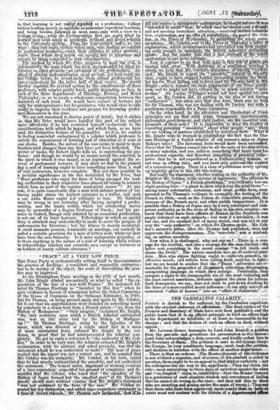"PEACE". AT A VERY LOW PRICE.
Tiee Peace Party is systematically setting itself to.A,ecountenance the practice of duelling : a consistent and reasonib-le enterprise ; but to be worthy of the object, the mode of diSerecliting the prac- tice may be improved. ot last month, he called " the su- 'He instanced Ad- ,Y7,ttig fear" when he gave evidence in favour of armaments before, the Select Committee of the House of Commons on the OrdnanCe Estimates, in 184S; but Sir Thomas on being pressed again anCagain by Mr. Cobden, let it out that his apprehensions were founded on something heard by somebody in a steam-boat from a Fiiiiatirleat—" no, from the Bishop of Madagascar." "Only- imagiii14,'ileiclaimect,Mr. Bright, "the only authority upon which a Britill'Alin/ral; anticipated war, was an idle story told by the I3iShOP of 'Madagas- car ! " Sir Thomas Hastings, stung by the injustice of the sneer, which was directed at a single small ft :14* Li iñass" of more substantial facts, referred Mr. Brigh 1.61r the evi- dence, in proof that he had misrepresented the"..1..- :I coin- pletely. He got in reply a reference to "the authOil? M.-Mr. cob- Alini:* In order to lie sure, the Aa: '•ral eX 1 .4'1:Brig s Siolamation, with Hs 'context, and ds ed precisely, 'iv` its that statement which he was authorized tOinake ? The miii[of peace replied that the report was not a correct one, dildrestated that
I
Mr. Cobden was his authority. Mr. Cobde Yliiirturn, stated -that he had Merely_ authenticated the aneed*t :4 not authorized the statement. '-'The honest sailor, impatient af 'Seeming evasions of a just reparation, respecified his ground of complaint, and de- manded that Mr. Cobden, who knew that "the anecd4tp of the Bishop of Japan formed butrilieibialiest pa.4" of Sir`,.Thoinas's Proofs, s)ibiild state withoUE'itiilin liiiit Mr. "was nor aniteined by the7fiibts of thelibi' Mr. ToIden re- peated his dry distinction, and added seine expository statement in a tone of covert ridicule. Sir Thomas now intimated, that if he At the Birmingham ?tree ;merlin
Mr. John Bright dil (iare • perstition of the fear 'iif.ik'sy with mind Sir Thomas Hastingi halm
and not meeting immediate attention —receivinfth4110, 4112 Et 1 lig, 1 •osetedler. Cob-
tion, exp o •
a 0
APP .1
1 .1i e Tfl it
IA I I 3 I 13. I
.
3
P ; „
i
9 VeRfs 4f1'
...`/Pft 4.187t1-PP .1 Al I I•11••• 1 n't WOII
ivnr I al
'''III
"
.1 us • 111
• 1.
I'- •
II
•
11
fac using "r woufli ?ris hit When once that was- &AY- er .61 fez- Sir l'hfRip.ii; was not dealing Writ Sea 'Tr 6.141Vh
Ont1C14,R onsible for a Peace reP fion. _ On do the ailvocateS and il:- prineiplépt that solid sense, ti tupaxft 8
philosophic our, and irid justice, 'SA §sefitv plements o elks? ? im idirst, pit Nell repeating gOssiping ineed ' ' what r 4,444,1' we are talking of matters es tit' notori Waft' Mr. Bright were to tine:oget ,thgb-rothine tlii-fiCf that Sir Tho- mas Haetings a -foplish ee okk.,„„inevs:tales or Japan Bishop's tales?, The historAaal-dada -woubihave been untouched. Prove that &r:TliOrnaiielinnol,titkein all the sails of his ship within so litany- rainntoli; and 'you ieve something that bears professubial capacity,' and th4refore something of •acti
i , prove that he s not expeikne,ed Pailiamen or not wise in sifting tales, and you lain only achieved :Ito esitnit of a censorious gossip. There-is a class of politicians newly sprung up mightily given to this idle tale-telling.
*temBut really the statement, whether resting On the autlib r. Brighter -Mr. Cobden, is the reiersenuons. the Bishop ofJapan " a French gentle' - 1 r was evidently but one ,‘ • slight passing hint-1" a straw to show which-a-ay the find blows "— amobg many substantial, notoriolts, and large pubhe facte,. merated in Sir Thomas's evidenenitO, exemplify the -feelinvef the French in 1844,—such as the Prinde.Ide oiaville'a painplanklir increase of the French. navy, and other:pablie transactione. Atm possible that a Bishop of Japan may be a very intelligent 'and ems.
tent authority as to the state of feeling in his.-Olvliceulstaye
ow that there have been officers of Franco WAG Sonthem seta amply informed on such subjects: but were it a taivialit/e-it=100 but one, and the smallest fact of many stated, and waihnot, i.x ality way. the "only authority on Arhicli ir ThonntanoYe. -:Ittkorenkr den's: sarcaotip letter, after :-OirTTkanas had -.pkite'd, deft aggravate.the disingenuous. er The "aneedute"', was a raiel Mg, an untrue anecdote..
Now when it is eliallengeel,ilerhy not say so ? There is al oe,__. rage for the duellist, and also a courage for the tion-ducllitadithe
latter sort consisting in the moral courage " tyntbi. and shame the Devil.' The untrue anecdote was an iil-rfainfr4,aneo- dote. . Men who abjure fighting ought to onAtilvate peaceful, ie,- offensive moods, and refrain from calling .fortkinotivee to fight: but we re bound to oinfess that the "Feacst.":.advacaztes are, re- markahle for the proportion of ill-natured, ridicilingib.sparaging, exasperating language in 'which they indulge. Paontieally, they arrogate a right to the irresponsible gwoithe most irritating and the least correct assertions, obdurate pgist the claim for redress. Such demeanour, we-,say,,,does no0,400, to put down ,duelling by the force of a more exalted.pioralAnfkience—it can only penyert an occasional "affair of bpnourf.;,inte an "affair of dishonour." "I I • 11
ar lasq
mese an he . d° ' • . •
tz al V 1 1L a e3-1.
e
"
. .
• r,
le •
.1
1 11
1.11 1 • • 31 ethe thYllgi 6'
I I 3
1„.1.11
9
s o Cobden did, 'by pidttU ti A
I.


























 Previous page
Previous page